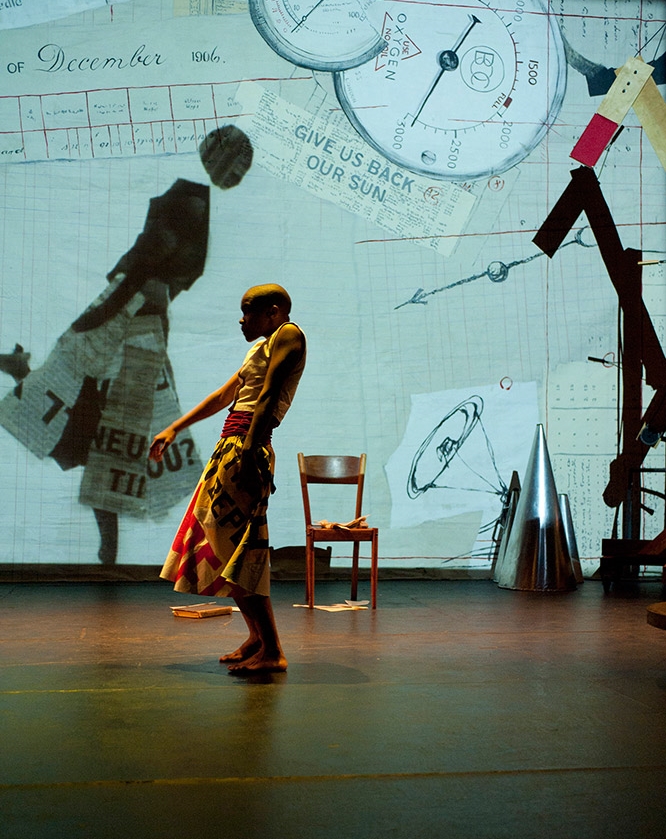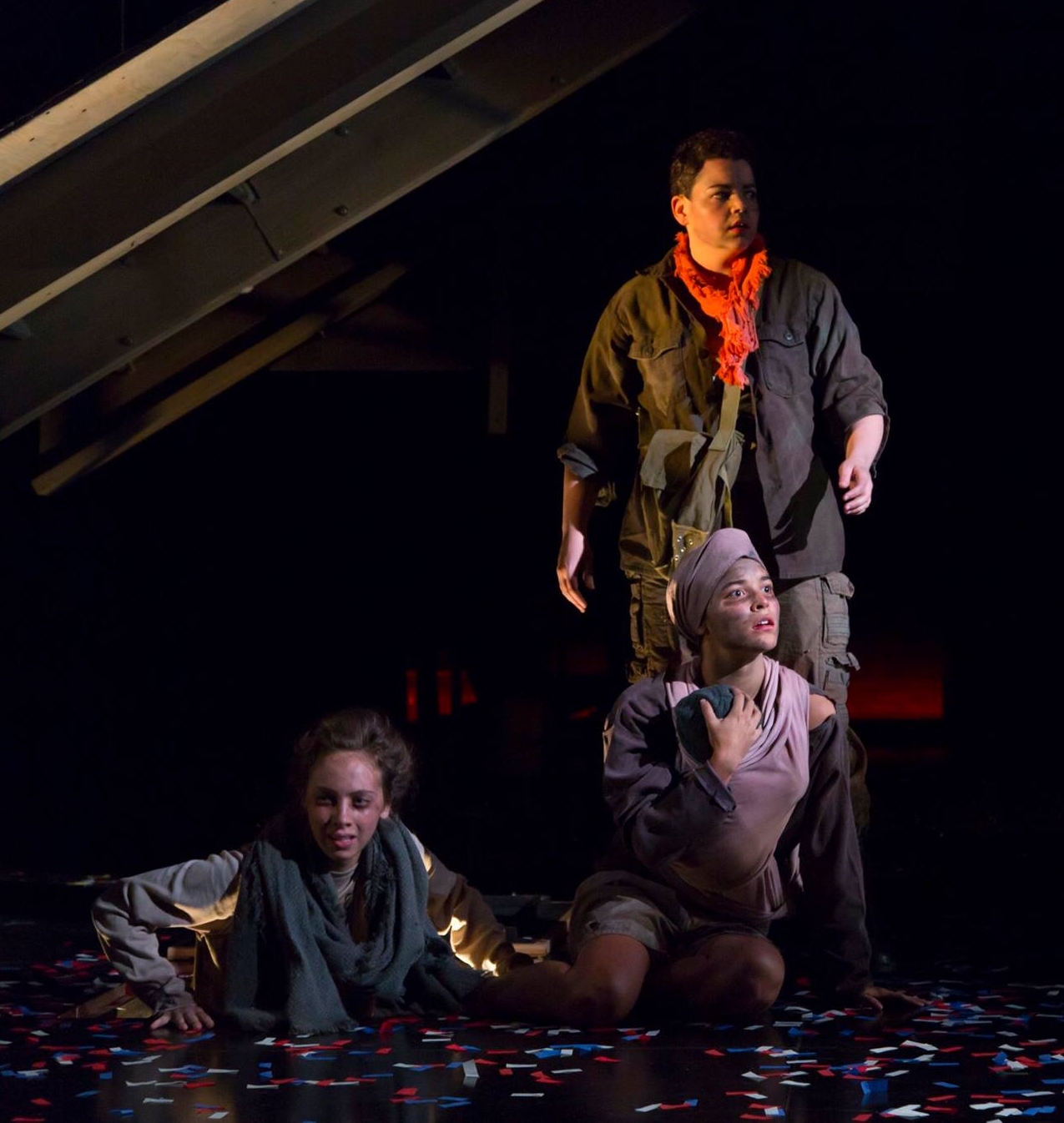Review of The Body of an American at Hartford Stage
Dan O’Brien’s The Body of an American, directed with deft control by Jo Bonney at Hartford Stage, is great storytelling. With a cast of two both acting as narrators and a variety of characters, the telling of the story is a large part of the theatrics here.
Michael Crane (Dan)
Often, we’re not watching scenes occur between characters, but rather the recollection of scenes as Michael Crane, as the playwright Dan, tells us how he got interested in photojournalist Paul Watson (Michael Cumpsty) and then interacted with him—via email—and eventually met with him in the frozen wastes of Canada. And Paul is often recalling his adventures as well—assignments that took him to many hot spots of warfare, such Mogodishu, in 1994, where he took a photo of the desecrated body of U.S. serviceman Sgt. David Cleveland, which won Watson a Pulitzer. While all this collective recollection makes the play rather talky, O’Brien’s cut-up narrative technique gives the show a lot of energy, and Alex Basco Koch’s projections and Richard Hoover’s scenic design keep the visuals interesting.
Michael Crane, Michael Cumpsty
The story unfolds primarily through recited emails between the two men, with Dan hoping to use Paul’s experiences as the basis of a play (with the play we’re watching the result), and Paul letting Dan have glimpses of his nomadic life with its risks and rewards. Key to the first half of the show—which runs for a swift 90 minutes with no intermission—is Paul’s story of how he took the photo of Cleveland, while hearing a voice in his head he felt was Cleveland’s say “If you do this, I will own you forever.” The sense of being haunted by the experience of taking the photo comes through strongly.
The fact that the photo made Watson’s name gives credence to the idea that Watson “owes” Cleveland forever. The basis of the owning and owing floats through the play like a plaintive ghost—bringing in all kinds of associations about what civilians owe the military and to what extent the military “owns” U.S. policy—but, while Watson is willing to be owned by the call of duty to be where the action is, the purposes behind such actions are only glanced at. Still, there’s a fascinating underlying theme of what it means to record real events via cameras and what it means to recount a life’s work via theater that makes The Body of an American worth thinking about.
Michael Cumpsty (Paul)
In O’Brien’s hands, Watson emerges as a driven and ambitious professional who also maintains a somewhat romantic sense of his role in the world and that, Dan seems to think, makes him the stuff of drama. In a sense, it’s a miscalculation, this effort to use theater to reveal a) the personal dynamism and difficulties of one man, Paul Watson, and b) the personal difficulties of the playwright, Dan O'Brien, as filtered through his dealings with Watson. This becomes evident in the second half of the play when the two finally meet and spend time together in the Arctic. These scenes have the feel of the awkwardness and incidental boredom of real life, without any great sense of meaning coming from the meeting. That might not be so bad, except that the first half of the play dazzles us with the kinds of stories Paul can tell at a moment’s notice, having been in places and seen things few others have. The Arctic scenes make only too clear that, when not writing a play, a playwright isn’t very interesting and, while not taking hard-to-believe photos, a photojournalist is just killing time.
Yet the play does have one last ace up its sleeve: the phone call Paul placed to the family—particularly the mother—of Sgt. Cleveland. Paul doesn’t get to talk to her, but gets a brusque call from Cleveland’s brother that becomes increasingly riveting as we see both how much Paul needs to get some kind of response from those who know Cleveland and how much patience and sympathy the sergeant’s brother grudgingly expends in the face of Paul’s desperation. As played by Crane and Cumpsty, the scene finally lets us see the play’s dramatic situation reversed: normally it’s Crane, as Dan, trying to get some kind of concession of feelings from Cumpsty, as Paul. While the phone call may not come off as a great reveal about Paul, it does help to sustain Dan’s notion that his effort to get through Paul's flinty, ironic stance paid off.
The ensemble work between the actors is truly a tour de force, with Crane’s ability to morph into a variety of minor characters greatly entertaining. As Watson, Cumpsty has a craggy, world-weary cheer that helps us believe in the character's lack of illusions, while the clipped give-and-take of most of their exchanges embodies the way even “true stories” are staged, and framed, and suited to a purpose.
The Body of an American
By Dan O’Brien
Directed by Jo Bonney
Scenic Design: Richard Hoover; Costume Design: Ilona Somogyi; Lighting Design: Lap Chi Chu; Sound Design: Darron L. West; Projection Design: Alex Basco Koch; Dialect Coach: Deborah Hecht; Casting: Binder Casting; Dramaturg: Elizabeth Williamson; Production Stage Manager: Lori Ann Zepp; Assistant Stage Manager: Alisa Zeljeznjak
Hartford Stage
January 7-31, 2016










































